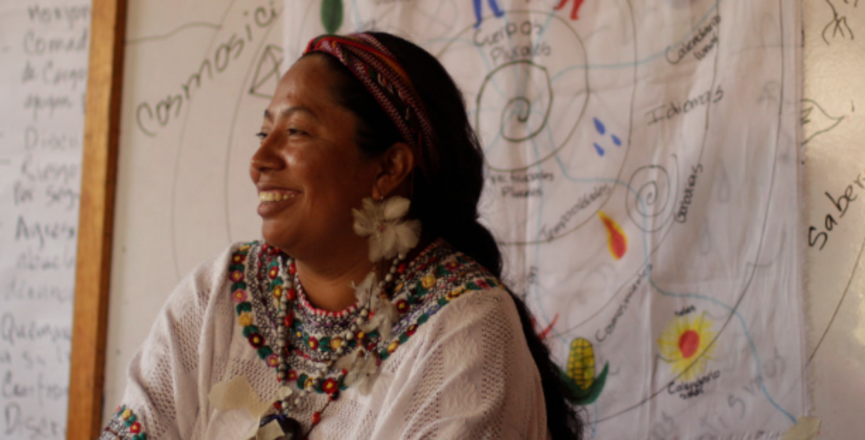The Peace Brigades International-Guatemala project has accompanied Lorena Cabnal, a Mayan Q’eqchi’-xinka healer and feminist, since 2006.
PBI-Guatemala recently posted on its Facebook page two articles about Lorena: “Healing as a cosmic-political path” (in Ruda: “Women and Territory”) and “Lorena Cabnal: Healing, feminism and community defense” (in Luchadoras).
Some of the concepts helpful in understanding Lorena’s vision and the work of TZ’KAT Red de Sanadoras Ancestrales del Feminismo Comunitario desde Ixmulew – TZ’KAT Network of Ancestral Healers of Community, Territorial Feminism from Iximulew (which has been accompanied by PBI-Guatemala since 2018) include:
Territorialism — This conveys that the identity of Indigenous peoples is linked to a specific territory and ecological system.
Body-land territory — This is an historical-structural analysis that sees the struggle for the defence of land against extractivism as inseparable from the struggle for women in those territories to live free from violence against their bodies.
Territorial feminism — This sees the recovery of territory and the integrity of Indigenous women’s bodies as an integral part of the journey towards emancipation. It recognizes the structural and other violence against the bodies of Indigenous women, while seeing the body as a means through which liberation becomes possible.
Extractivism and patriarchal culture — This sees extractivism (oil and gas, mining, logging, dams) as exacerbating patriarchal culture, which impacts women’s lives. It links mega-projects with a masculinization of territories and the restructuring of community spaces and daily life to fit the values of hegemonic masculinity.
Territorial femicide — This refers to the systematic persecution and murder of women environmental human rights defenders, women’s rights and territorial defenders.
Cosmovision — A cosmovision defines common notions that apply to all areas of life, from politics, the economy and science, to religion, morality and philosophy. It also refers to the interconnectedness of all of us with each other and with nature.
Ancestral memories — This refers to both the remote memories of violence against ancestors at the time of colonization, the more recent memories of violence, criminalization and persecution, as well as ancestral memories of learning from elders, healing, walking in nature and gathering medicines.
To hear from Lorena directly, please see “In her own words: Lorena Cabnal” (in English on the PBI-UK website), “Lorena Cabnal: ‘I recover the joy without losing the indignation, as an emancipatory and vital act’” (in Spanish) and “Weaving the network” (in Spanish).
For a continued study on this, please see the Peace Brigades International publication: “Guatemala’s Indigenous Women in Resistance: On the Frontline of the Community’s Struggle to Defend Mother Earth and her Natural Assets.”
Please also see this PBI-Netherlands publication: “Strong Women Safe in Action: A Comprehensive Guide on Women Human Rights Defenders’ Protection.”
To relate the worldview of Lorena and TZ’KAT to events this past week in this country, please see the photo essay “Wet’suwet’en Matriarchs Arrested as RCMP Enforce Coastal GasLink Pipeline Injunction” by Amber Bracken in The Narwhal.
Brent Patterson in the executive director of Peace Brigades International-Canada. This article originally appeared on the PBI-Canada website.
Image: PBI Canada



